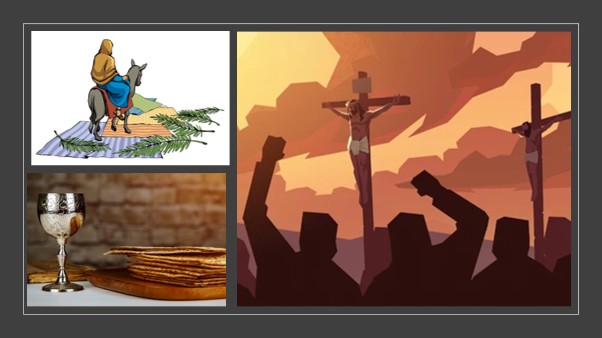This Sunday, the lectionary invites us to ponder John 13:31-35. The English Standard Version supplies the heading “A New Commandment.”
Jesus has raised Lazarus from the dead. He’s entered Jerusalem riding a donkey, like Jewish kings of old. Greeks have come seeking him. Everyone’s talking about him. His “hour” has come. He must die like a seed, grow like a tree, bear fruit. Be raised up, draw all men to himself.
The religious and political leaders are in a state of heightened anxiety. In chapter 12, in the buildup to today’s chapter, John says:
“many even of the authorities believed in him, but for fear of the Pharisees they did not confess it, so that they would not be put out of the synagogue; for they loved the glory that comes from man more than the glory that comes from God.” [1]
Jesus divides people. Just like the prophets did.
He says the leaders see that he’s performed “many signs;” [2] yet, they choose not to honour him. He says this shows that they love “the glory that comes from man more than the glory that comes from God.” He says their choice, their sin, has made them blind.
For that’s the law of God. Just like the law which says if I park there, my car will be towed away.
We have to make choices. Choices which either help or harm us and our neighbours. Jesus says everyone lives in God’s world. Everyone is subject to the operation of God’s laws, God’s commandments.
Jesus says he has obeyed the commandment given him by “the Father,” by God. He says God will judge those who don’t believe his claims about himself. He says his job is to save. It’s God’s job to judge, to decide. And God decides who gets, or doesn’t get, eternal life.
That’s all in chapter 12. In chapter 13, John begins his account of the last meal Jesus had with the twelve men he hand-picked and trained for three years. This account takes up nearly a quarter of John’s gospel.
It’s a Passover meal. An annual meal to re-tell God’s action to save his people in the past. A meal centred on a sacrificed lamb. A meal tense with expectation of united, quick departure, to avoid death. A meal to recall God’s promise to their ancestor Abraham, to plant his offspring in a “Promised Land,” a land flowing with goodness, with “milk and honey.” [3]
Jesus gives new meaning to the meal – the meal now enacted millions of times daily, and especially on Sundays, in churches around the world: with names like Communion, or Lord’s Supper, or Eucharist, or Mass.
The new meaning Jesus gave the meal opposes the ideas of most religious and political leaders. It opposes their ideas of honour and glory. It’s at the heart of preaching which “turn[ed] the world upside down,” the image used by the leading Jews in Thessalonica to explain why they wanted to kill the preachers Paul and Silas. [4] You can read it in Acts 17.
Jesus began the meal very differently from the way it had been practiced for centuries. He began by washing the feet of his students, his disciples. He began by doing the work of servants. He modelled “servant-leadership,” the opposite also of the Romans who lorded it over people.[5]
Then, he sent Judas off to betray him to the leaders who wanted to protect their own honour and glory. It’s important to see that Jesus flagged off the betrayal which led to his arrest and crucifixion.
The betrayer is no more in the room. Jesus begins his final instruction to his disciples. Verse 31-32 read:
“When [Judas] had gone out, Jesus said, “Now is the Son of Man glorified, and God is glorified in him. If God is glorified in him, God will also glorify him in himself, and glorify him at once.”
When Jesus speaks of “glory,” what is he pointing us to?
In the introduction to his gospel, John tells us:
“And the Word became flesh and dwelt among us, and we have seen his glory, glory as of the only Son from the Father, full of grace and truth.” [6]
In the Bible, the word “glory” is used to describe times when God’s presence is made known, revealed. Jesus and John follow that usage.
In our passage, Jesus points to the beginning of the end of the revealing of his glory. Within 24 hours, Jesus, the doer of signs, would be raised up on a cross. And killed. Killed as the lamb of God. It’s the beginning of the end, not the end, because God would then raise Jesus up from the dead.
What did Jesus say in his last hours? Listen to verses 34-35:
“A new commandment I give to you, that you love one another: just as I have loved you, you also are to love one another. By this all people will know that you are my disciples, if you have love for one another.”
That means being washed by Jesus. Being broken like him. Giving others more honour than we receive. Breaking conventional ideas of greatness. Giving equal honour to everyone, regardless of wealth, class, caste.
That means reflecting the Father’s glory.
Peace be with you.
[2] John 12:37.
[3] Exodus 3:8.
[5] See Matthew 20:25-28.
To learn more about Rama, click here.



Pingback: Love and Obedience: Insights from John 14 – Bangsar Lutheran Church